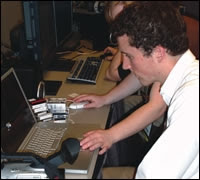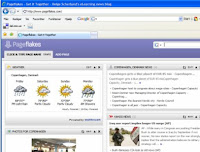
Here are some interesting eLearning headline news around the Web.
SETDA, Cable in the Classroom call attention to the importance of media literacy in preparing students for an increasingly digital world
 Nearly three out of five states say they have defined what it means for students to be "media literate" and have implemented media-literacy standards, according to a recent survey - a result suggesting that states are beginning to address the importance of preparing students for an information-rich society, but they still have more work to do.
Nearly three out of five states say they have defined what it means for students to be "media literate" and have implemented media-literacy standards, according to a recent survey - a result suggesting that states are beginning to address the importance of preparing students for an information-rich society, but they still have more work to do.Called "The Changing Media Landscape: Ensuring Students' Safety and Success in School and in the Future Workplace," the survey was developed "to get a snapshot of how states are assisting schools to prepare today's students to be ready for life, work, and citizenship in our increasingly digital world," said Mary Ann Wolf, executive director of the State Educational Technology Directors Association (SETDA).
SETDA developed and administered the survey in partnership with Cable in the Classroom (CIC), the cable industry's education foundation. The two groups issued the results, along with a media-literacy toolkit that SETDA created to help promote "a systemic approach for [teaching] information and media literacy within our schools."
Pageflakes is an easy way for educators and students to create and share web content

Pageflakes, a community-driven personalized home page founded last year, is using Web 2.0 technology to revolutionize how schools and others use the internet through a process known as "pagecasting."
Teachers and students have found it a fast and easy way to set up an online learning environment without any programming skills and at no cost. Using Pageflakes, educators arrange "Flakes" - small, movable versions of popular web sites, interactive research tools, and education-specific applications--on a customized web page.
Link:
Source: eSchool News
Do whiteboards have a future in the UK classroom?
See this short report outlining these argument below.
The Royal Institute of Chartered Surveyors was the setting, on 24 May, for a lively discussion on the educational merits of interactive whiteboards.
Interactive whiteboards – large, touch-sensitive computer screens that replace a traditional blackboard or whiteboard – have been adopted in British classrooms at a dizzying pace. Actively promoted by the DfES and Ofsted, they are now used in both secondary and primary schools throughout the UK.
 But has all this happened too soon? Do interactive whiteboards enable teachers to transform learning, through engaging and motivating learners, as their proponents argue? Or are they just a technological fad, an expensive and glossy veneer on old-fashioned chalk 'n' talk? If, as the government plans, we are to move towards a more personalised approach to learning, where learners have greater influence over their lessons, a discussion about the role technology can play in bringing about change is crucial.
But has all this happened too soon? Do interactive whiteboards enable teachers to transform learning, through engaging and motivating learners, as their proponents argue? Or are they just a technological fad, an expensive and glossy veneer on old-fashioned chalk 'n' talk? If, as the government plans, we are to move towards a more personalised approach to learning, where learners have greater influence over their lessons, a discussion about the role technology can play in bringing about change is crucial.
Interactive whiteboards – large, touch-sensitive computer screens that replace a traditional blackboard or whiteboard – have been adopted in British classrooms at a dizzying pace. Actively promoted by the DfES and Ofsted, they are now used in both secondary and primary schools throughout the UK.
 But has all this happened too soon? Do interactive whiteboards enable teachers to transform learning, through engaging and motivating learners, as their proponents argue? Or are they just a technological fad, an expensive and glossy veneer on old-fashioned chalk 'n' talk? If, as the government plans, we are to move towards a more personalised approach to learning, where learners have greater influence over their lessons, a discussion about the role technology can play in bringing about change is crucial.
But has all this happened too soon? Do interactive whiteboards enable teachers to transform learning, through engaging and motivating learners, as their proponents argue? Or are they just a technological fad, an expensive and glossy veneer on old-fashioned chalk 'n' talk? If, as the government plans, we are to move towards a more personalised approach to learning, where learners have greater influence over their lessons, a discussion about the role technology can play in bringing about change is crucial.Source: Futurelab











